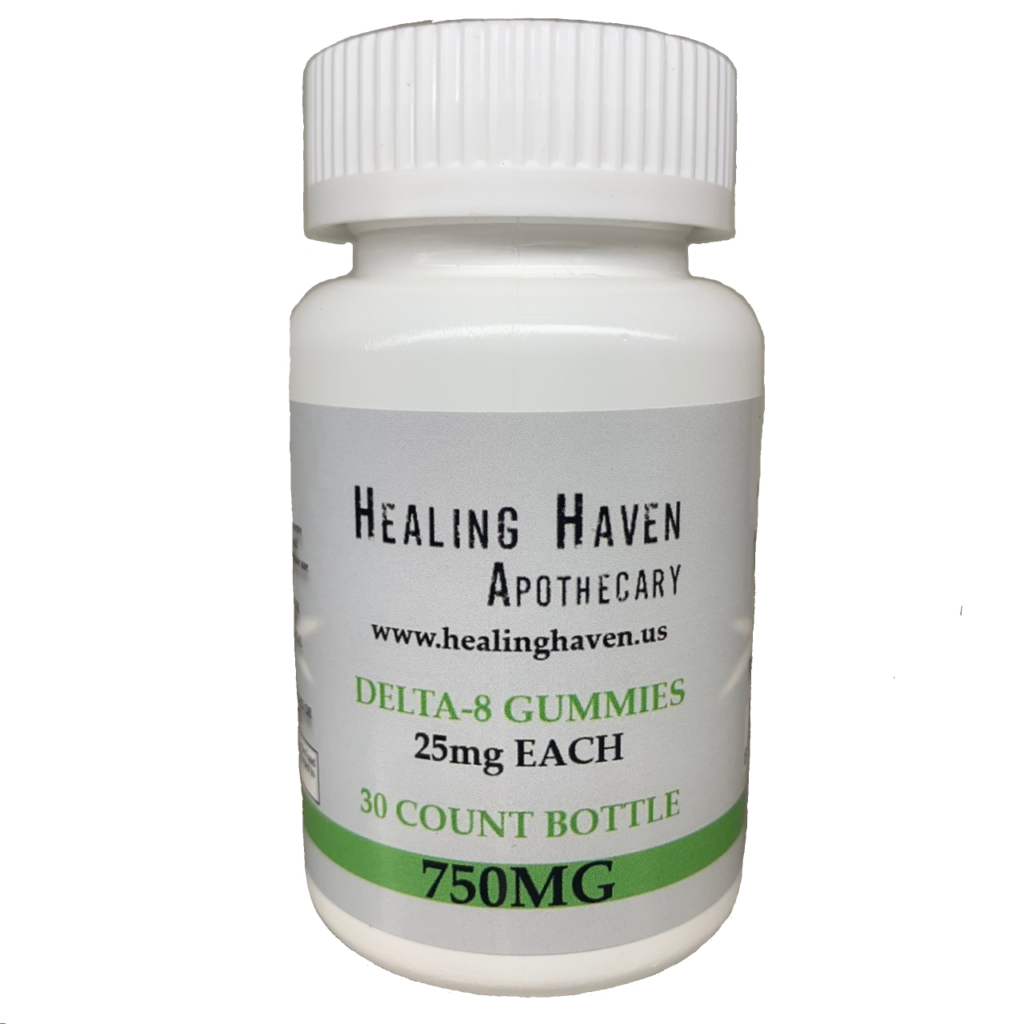Delta-8-THC is a minor cannabinoid, occurring in cannabis in very small concentrations. Delta-8-THC is also a degraded form of delta-9-THC. When THC is stored for a long period of time, it degrades into delta-8-THC.

What is delta-8-THC?
There are more than 100 cannabinoids present in the cannabis plant. While we have some foundational knowledge about primary cannabinoids like delta-9-THC (more commonly known as THC) and cannabidiol (CBD), we know less about the secondary, or minor, cannabinoids like delta-8-THC.
Delta-8-THC is distinct from THC, the most abundant and intoxicating cannabinoid found in cannabis. Delta-8-THC is an analog of THC and has a similar molecular structure with a few notable differences. While the two share many similar properties, such as reportedly stimulating appetite, reducing nausea, and soothing pain, delta-8-THC tends to exhibit a lower psychotropic potency than THC when inhaled. When ingested, however, delta-8-THC can deliver the same intoxicating effects as THC. So be mindful when trying delta-8-THC edibles for the first time and use the same caution you would with THC edibles.
Delta-9-THC vs delta-8-THC: similarities and differences
Chemical structure
From a chemical or structural perspective, delta-8-THC differs from delta-9-THC due to the location of a critical chemical bond. Both forms of THC contain double bonds in their molecular chain. Delta-8-THC contains that bond on the 8th carbon chain, while delta-9-THC contains the bond on the 9th carbon chain. Although it seems like a subtle difference, it has a major impact on the shape of these molecules. This shape directly determines how well the molecules are able to bind to the body’s endocannabinoid receptors.
Molecular stability
Delta-9-THC is less stable than delta-8-THC. Delta-9-THC is easily oxidized to become cannabinol (CBN) or delta-8-THC. Delta-8-THC is stable, does not oxidize to become CBN, and boasts a prolonged shelf life. Such stability is desirable in a medicinal compound.
Affinity for cannabinoid receptors
Delta-8-THC, when inhaled, binds to the CB1 receptor like delta-9-THC, but its affinity for the receptor is different due to its slightly altered molecular structure and related shape. The CB1 receptor is responsible for mediating most of the psychotropic effects of THC. This differential binding may be responsible for delta-8-THC’s reportedly producing a clearer high with less anxiety than delta-9-THC. It’s also possible that delta-8-THC’s molecular structure affects how it interacts with other receptors and neural pathways.
Effects from consumption
Plenty of clinical and anecdotal evidence points to delta-9-THC having intoxicating effects when consumed via inhalation or ingestion. We know much less about the effects of delta-8-THC. Some say delta-8-THC produces a milder, clearer high than delta-9-THC even at higher doses. However, pharmacologically, delta-8-THC edibles function very similarly to delta-9-THC edibles, with both molecules converting into 11-hydroxy-THC in the liver. Because there is so much we have yet to learn about delta-8-THC, and because the effects are very different depending on whether it’s ingested or inhaled, it’s wise to treat these products with the same caution you would treat THC products.
WARNING: Exercise extra caution when trying delta-8-THC edibles for the first time.

∆8 Vegan Hemp Gummies 25mg each 30ct 750mg
Delta-8-THC’s medical potential
A range of preclinical and clinical studies are uncovering some of the unique properties and therapeutic potential of delta-8-THC.
Pain and inflammation
A 2018 preclinical study published in Cannabis and Cannabinoid Research found that delta-8-THC may help to diminish pain and inflammation in corneal injury in mice. The research found that delta-8-THC, applied topically, assisted in pain reduction, and reduced inflammation through its effects on the CB1 receptors. Another preclinical study on rats reported that delta-8-THC delivers pain relief, but that tolerance to the cannabinoid developed rapidly.
Anxiety
According to the US National Library of Medicine, delta-8-THC displays anxiety-reducing qualities similar to delta-9-THC. Anecdotal reports claim that the consumption of delta-8-THC results in a calm, focused high, but we need more clinical research into its anti-anxiety potential before drawing any conclusions.
Nausea
The nausea-fighting potential of delta-8-THC was reported in a 1995 study published in Life Sciences. The study followed eight pediatric cancer patients over two years and found that no vomiting occurred when patients ingested delta-8-THC before and for 24 hours after cancer treatment. The study reported very few side effects.
Lose of appetite
Delta-8-THC may also help stimulate the appetite. Research conducted on mice and published in 2004 in Pharmacology, Biochemistry and Behavior found that a low dose of delta-8-THC administered to mice over 50 days resulted in a 22% increase in food intake compared with controls. The research also reported that delta-8-THC increased food intake significantly more than delta-9-THC, a known appetite stimulant.
Side effects and warnings
Since it’s a minor cannabinoid, we have much more to learn about delta-8-THC, which necessitates a cautious approach toward using it. Presently, the cannabinoid is generally available in concentrated forms, because cannabis flower usually contains less than 1% delta-8-THC.
To acquire a substantial quantity of this cannabinoid, a significant amount of extraction and refinement must take place. While some delta-8-THC concentrates are isolates, other products may combine delta-8-THC with CBD and/or delta-9-THC for a more full-spectrum effect.
If you’re thinking about consuming delta-8-THC, it’s vital to be aware that a great deal of the current knowledge we have about the cannabinoid is based on animal studies. Research on animals has indicated that delta-8-THC (along with delta-9-THC) resulted in increased blood pressure by temporarily constricting the blood vessels. The rise in blood pressure was then followed by a drop in blood pressure and a slower heart rate.
The effects observed in animals can be very different from the effects observed in humans, as evidenced in a 2018 systematic review published in Pharmaceuticals. For example, while delta-8-THC significantly slowed heart rate in animals, it conversely increased heart rate in humans. The authors of the review concluded that there is limited data about the effects of delta-8-THC, and further studies need to be conducted in human populations to understand how it induces changes in blood flow.
WARNING: Exercise caution when trying delta-8-THC products for the first time.
Ingesting vs. inhaling delta-8-THC
You should also be aware that like delta-9-THC, ingested delta-8-THC gets converted to 11-hydroxy-THC in the liver. This results in many people overindulging in edibles without realizing it. This also means hemp-derived delta-8-THC edibles may be just as potent as marijuana-derived edibles. Though sometimes unregulated, delta-8-THC edibles can still lead to a very uncomfortable psychological shift for the unprepared.
Inhaling delta-8-THC won’t send the cannabinoid to your liver, and as a result, won’t produce the same potentially intoxicating effects.
WARNING: Exercise extra caution when trying delta-8-THC for the first time.
SOURCE: WEEDMAPS.COM
Delta 8 Gummy Giveaway!Statements regarding Delta-8, CBD, hemp, or dietary supplements have not been evaluated by the FDA, and are not intended to diagnose, treat, cure, or prevent any disease or health condition.
